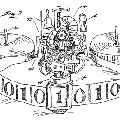Flauschbuch reviewed Binti by Nnedi Okorafor (Binti, #1)
Didnt't work for me
3 stars
I listened to the audiobook and needed what felt like ages to finish it - which is weird because it's a rather short story. I expected a different story than what we get. This is another contender for the "well, that escalated quickly" category. There were some interesting aspects, especially the maths angle to it all. But overall, it felt a little thin to me, somehow.
I listened to the audiobook and needed what felt like ages to finish it - which is weird because it's a rather short story. I expected a different story than what we get. This is another contender for the "well, that escalated quickly" category. There were some interesting aspects, especially the maths angle to it all. But overall, it felt a little thin to me, somehow.













